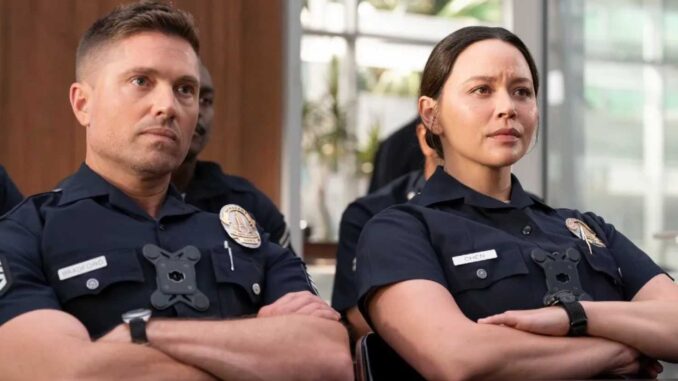
Beyond the Siren's Call: How The Rookie Season 8 Could Fix Ongoing Problems
The Rookie has, for seven vibrant seasons, captured the hearts of audiences with its blend of high-octane police work, endearing character dynamics, and a unique premise centered on John Nolan, the oldest rookie in the LAPD. Yet, even the most beloved shows, as they mature, can fall into predictable rhythms or neglect compelling narrative avenues. As the prospect of Season 8 looms, it presents not just an opportunity for more action and humor, but a crucial moment for introspection and revitalization. This next chapter could skillfully address some ongoing issues, re-energizing the series and solidifying its legacy as more than just another police procedural.
One of the most persistent and, at times, frustrating patterns has been the relationship carousel. While the will-they-won't-they dance between characters like Lucy Chen and Tim Bradford, or the on-again-off-again nature of Nolan's various romantic entanglements, provides immediate dramatic tension, it can eventually lead to stagnation. By Season 8, viewers have invested deeply in these relationships. A fix wouldn't necessarily mean permanent happy endings, but rather a deepening of the challenges faced within committed partnerships. Imagine Tim and Lucy navigating the unique pressures of dual police careers, perhaps confronting a difficult case that tests their ethical boundaries and puts a strain on their personal lives, requiring genuine, hard-won communication to overcome. Or picture Nolan and Bailey making a profound life decision – a long-term commitment, perhaps even a family expansion – that forces them to confront fears and re-evaluate priorities, creating rich, internal conflict beyond just a simple break-up or make-up. The drama should evolve from getting together to staying together through life's complexities, offering a more mature and relatable exploration of love under pressure.
Another area ripe for recalibration is John Nolan’s professional arc. While his journey from construction worker to police officer, and eventually to a training officer, has been inspiring, his current role feels somewhat static. By Season 8, Nolan is no longer the wide-eyed rookie, nor is he solely a mentor for Celina. To truly fulfill his potential, the show could propel him into a specialized, purpose-driven role that leverages his unique life experience and philosophical approach to policing. Perhaps he could pioneer a new community outreach program, focusing on de-escalation and restorative justice, using his empathetic nature to bridge divides between the LAPD and the neighborhoods they serve. Alternatively, a move into a detective role within a niche unit – say, cold cases or missing persons – would allow his meticulous nature and unconventional thinking to shine, providing fresh narrative avenues for complex, serialized investigations that move beyond the typical "case of the week" structure. This wouldn't just be a promotion; it would be an evolution that speaks to the very heart of the show's initial premise: that it's never too late to find your true calling and make a difference.
Furthermore, The Rookie has sometimes struggled with lasting stakes and consequences. Major incidents, from kidnappings to precinct takeovers, often resolve with surprising expediency and minimal long-term emotional or professional fallout for the primary characters. To inject a necessary gravitas, Season 8 could embrace more profound, character-defining repercussions. This doesn't necessarily mean killing off a main character, but rather allowing difficult choices to have a tangible, enduring impact. Imagine a scenario where a critical decision made by Grey or Nyla has a ripple effect, leading to a professional investigation or a personal crisis that challenges their core beliefs and requires months, even an entire season, to navigate. Or perhaps one of the younger officers, like Aaron Thorsen, makes a split-second call that saves lives but results in him facing public scrutiny and an internal review, forcing him to grow in resilience and self-reflection. By showing that actions, even heroic ones, can have unforeseen and challenging consequences, the show would elevate its dramatic weight and foster a deeper emotional connection with its audience.
Finally, Season 8 offers a golden opportunity to expand and deepen the ensemble narrative. While Nolan, Chen, and Bradford remain central, characters like Aaron Thorsen, Celina Juarez, Nyla Harper, and Angela Lopez often feel like satellites orbiting the main trio. Giving these characters more independent, multi-episode story arcs – not just as supporting players in someone else's drama, but as protagonists of their own – would enrich the entire series. Picture Aaron dealing with systemic issues within the police force, using his unique perspective as a Black officer and a survivor of trauma to advocate for change. Envision Celina tackling a particularly haunting case that forces her to confront her spiritual beliefs and grow as a detective, moving beyond just her connection to Nolan. A deeper dive into Harper’s past as an undercover officer, perhaps resurfacing a past adversary or unaddressed trauma, could provide intensely personal stakes. By weaving these parallel, impactful narratives, the show would transform from a primary trio with supporting players into a truly robust ensemble, reflecting the diverse and interconnected world of a modern police precinct.
In essence, The Rookie Season 8 has the chance to evolve, not just by continuing its proven formula, but by bravely addressing its narrative habits. By allowing relationships to mature through struggle, propelling John Nolan into a truly impactful new role, embracing lasting consequences, and deepening the lives of its rich ensemble, the show can shed its minor frustrations and emerge as an even more sophisticated, emotionally resonant, and enduring testament to the complex, challenging, and ultimately human work of policing. The siren's call of novelty and comfort is strong, but the true strength of a long-running series lies in its willingness to confront its own evolution.
